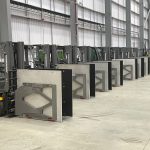IN recent years, Zimbabwe’s construction industry has faced numerous challenges, including an economic downturn, limited access to financing, and political instability. These factors have affected growth and investment in the sector. However, the industry has shown resilience and witnessed some positive developments, such as, the recent influx of investments into shopping malls by foreign investors. Our reporter Belinda Chiroodza (BC) this week caught up with the recently-appointed Zimbabwe Building Contractors Association (ZBCA) chief executive officer Joyline Zindaga (JZ, pictured) to discuss strategies around the growth of the construction industry. She says a lot of work awaits her as the industry gears for growth. But key among her most immediate tasks will be to roll out further engagements with the government to ensure that domestic players continue to get a fair share of massive construction projects that have been rolled out by the state authorities in the past few years. The projects range from road rehabilitation to dam construction countrywide.Below are excerpts of the interview.
BC: Congratulations on your appointment as CEO. Tell us about your vision for the ZBCA?
JZ: ZBCA is a business member-driven organisation and I intend to grow the membership in the construction industry. We are at a time where Zimbabwe is experiencing a construction boom and that speaks to how our services are imperative in industry. I am, particularly, expecting to advocate for equity in the construction and allied industries.
BC: What specific strategies will you implement to promote growth and development in the construction industry in Zimbabwe?
JZ: The theme for our last year’s annual conference was “From Industry 4.0 to Construction 5.0: Exploring and Enabling Collaborations and Transformations in Construction”. I am certain industry 4.0 initiatives have reached a plateau, so with the adoption of Construction 5.0 we aim to integrate technological and digital advancements in the building industry with the social aspects outlined in the United Nations’ 17 Sustainable Development Goals. That includes adopting building information modelling and other tools that boost efficiency of operations. Construction 5.0 is about sustainable construction. It presents an exciting vision for the future of construction. It is a future marked by high efficiency, safety, sustainability and a human-centrist approach, where technology complements human skills rather than replacing them
I applaud the second republic for bestowing local industry players in undertaking huge government projects, for which the majority are our members. I will push for more participation of our members and boost our skills and development programmes that keep our members updated with recent trends in the industry. Being a woman myself, I wish to see women-led construction companies leading in this male-dominated sector through the active participation of the association’s women desk. I intend to advocate for regulations that stimulate innovation, while ensuring safety and quality, standardisation and modularisation to improve efficiency and affordability in the industry through a consultative approach from the members themselves and other stakeholders.
BC: How do you plan to enhance collaboration between the association and government entities, such as regulatory bodies and ministries to address industry challenges?
JZ: We are going to establish specific committees dedicated to tackling key issues and bring positive changes. Some memorandum of understanding (MOUs) that were signed before, no longer speak to the mutual benefits between parties and we have to revisit them to align with the changes that have taken place thus far. This will help in fostering commitment from all parties. Regular dialogues are key as there is exchange of critical information, discussing concerns and identifying solutions.
BC: What steps will you take to ensure that ZBCA remains relevant and adaptive to technological advancements in the construction sector, especially in this artificial intelligence era?
JZ: Previously, I have mentioned the adoption of construction 5.0 and as an association, we are already transitioning to the new model that embraces technology. Remember in these modern times, the only thing constant is change. The built environment is constantly evolving, and the construction industry needs to keep pace. We have a training and development initiative that keeps our members abreast with trends.
BC: What are some of the challenges that the construction industry in Zimbabwe is currently facing?
JZ: Limited access to credit constrains our members’ ability to undertake large projects. These projects are capital intensive and require patient money. A significant portion of the construction industry operates informally, leading to safety concerns and poor quality standards. Slow uptake of innovative construction technologies reduces efficiency and productivity in the sector.
BC: Are foreign companies undertaking massive projects in the country subcontracting you? There have been concerns that they bring in their own contractors.
JZ: I have to commend the government once again for giving projects to local players. Yes, there might be engagements with foreign players but in most cases, they are being engaged on the basis of capacity for which with reports I have, some of the members are engaged for subcontracting.
BC: What strategies will you employ to promote investment in the construction industry?
JZ: We intend to heavily involve ourselves in hosting investor forums with business-to-business setup spruced with a match-making model. Information deficiencies are impediments to investment opportunities. ZBCA will constantly publish industry reports and data that will include sharing insights on market trends, and investment opportunities. We want to develop institutional partnerships with financial institutions specialising in infrastructure financing or construction loans to introduce members to potential funding sources.
BC: As local players, what sort of support would you need from the government?
JZ: The majority of companies struggle to secure loans due to limited credit history or collateral. Therefore, I do advocate for government-backed loan guarantees. Considering that we need to invest in equipment acquisition as an industry, I implore that the government introduces tax breaks for such. Upskilling the workforce in new technologies, safety protocols, and project management is crucial with ever-changing environments. Therefore, collaborations with government, and tertiary institutions to address the skills gap will be imperative.















